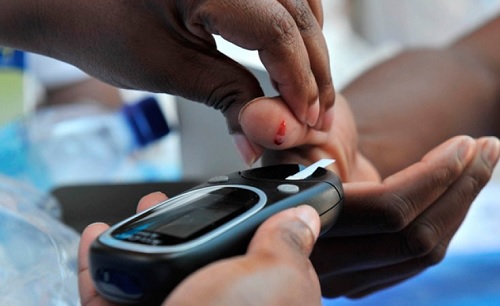
A ‘sweet’ death: Turning the tide on diabetes in Ghana
In the heart of a bustling marketplace in Accra, 48-year-old Kennedy Ampong sits quietly by his stall of ripe plantains, clutching a water bottle.
For years, Mr Ampong ignored persistent fatigue, blurry vision and frequent thirst, attributing them to aging and long hours of work.
It was not until he collapsed one afternoon that doctors diagnosed him with Type 2 diabetes—a condition silently wreaking havoc on his body.
Mr Ampong's story is not unique. According to the International Diabetes Federation, an estimated 1.8 million Ghanaians live with diabetes, a number projected to rise if urgent action is not taken.
This “sweet death,” driven by lifestyle changes, poor diet and limited awareness, is fast becoming a public health crisis in Ghana.
A growing epidemic
Dr Elliot Koranteng Tannor, a nephrologist and diabetes care advocate at the Komfo Anokye Teaching Hospital (KATH), describes diabetes as a ticking time bomb.

Dr Elliot Koranteng Tannor, Nephrologist and diabetes care advocate at the Komfo Anokye Teaching Hospital
“In Ghana, about seven out of every 100 people have some form of diabetes, with Type 2 diabetes accounting for 90-95 per cent of cases,” Dr Tannor reveals.
The rise in diabetes prevalence is linked to urbanisation, sedentary lifestyles and poor dietary habits. “If you inherit Type 2 diabetes, poor lifestyle choices can lead to an earlier onset,” he explains.
Unfortunately, many Ghanaians are unaware of their condition until severe complications such as kidney failure or strokes arise.
He stresses the importance of routine health checks, urging Ghanaians to regularly monitor their blood sugar and blood pressure levels. “Prevention and early management are key,” Dr Tannor emphasises.
In an alarming revelation, Dr Tannor also highlights the role of unregulated cosmetic products in Ghana’s diabetes epidemic. “Skin-bleaching creams and steroids, popular for cosmetic purposes, interfere with insulin production and contribute to diabetes,” he warns.
The role of diet
For many, the journey to diabetes begins on their plates. Emerald Akosua Opoku, a dietitian, points to the affordability of processed foods as a key challenge.
“Processed foods loaded with sugar and unhealthy fats are cheaper and more accessible than fresh fruits, vegetables and whole grains,” she explains.
This economic reality forces many low-income households to make unhealthy dietary choices. Additionally, societal perceptions around body image contribute to the problem. “In some communities, being ‘big’ is seen as a sign of wealth and health, normalising obesity—a major risk factor for diabetes,” Ms Opoku notes.
To combat this, Ms Opoku advocates the inclusion of affordable local foods such as millet, brown rice, kontomire and yams in everyday meals. “These traditional staples are nutritious, accessible and cost-effective,” she says.
She also champions community-based initiatives such as cooking classes and nutrition workshops. “Empowering people with practical knowledge about healthy eating can reduce the risk of diabetes significantly,” she suggests.
The human cost
Living with diabetes comes at a steep cost—both financially and emotionally. For patients like 54-year-old Maxwell Kofi Mensah, the burden is immense.
“I spend over GH₵500 monthly on medication, insulin and glucose monitoring supplies,” Maxwell shares. “There are days I skip my medication because I simply can’t afford it.”
Despite these challenges, Maxwell remains optimistic. “I’ve learned to manage my condition and teach my children about healthy living,” he says.
Dr Tannor acknowledges the financial barriers many patients face.
While some medications are covered under the National Health Insurance Scheme (NHIS), essential treatments such as insulin remain excluded.
This leaves many patients without access to comprehensive care.
Additionally, rural health centres often lack diagnostic tools and trained personnel to manage diabetes effectively. “Patients in rural areas are forced to travel long distances for care, which discourages early diagnosis and treatment,” Dr Tannor adds.
Policies and awareness
To tackle the diabetes epidemic, Ghana’s Ministry of Health has implemented initiatives such as wellness centres at district hospitals to promote early detection. However, gaps remain.
“Public awareness campaigns must use culturally sensitive messaging to dispel misconceptions about diabetes,” Dr Tannor said. Schools, too, can play a pivotal role by integrating nutrition education and physical activity into their curricula.
“If children learn healthy habits early, they are less likely to develop diabetes as adults,” Ms Opoku adds.
Peer support groups have also proven effective in diabetes management.
“When people share their experiences, it reduces stigma and helps them manage the condition better,” she says.
A manageable condition
While diabetes is incurable, it is manageable. Dr Tannor highlights success stories of patients who have lived with the condition for decades.
“We have patients who’ve managed their diabetes for over 50 years and are thriving. It’s not diabetes itself but its complications that are deadly,” he stresses.
He calls for collective action to curb the epidemic. “From individuals adopting healthier lifestyles to policymakers increasing funding for diabetes care, every step counts.”
A call to action
Diabetes is a silent epidemic threatening Ghana’s health and economy.
But it is not an insurmountable challenge.
By prioritising education, early detection and equitable access to care, Ghana can protect its future generations from this “sweet death.”
